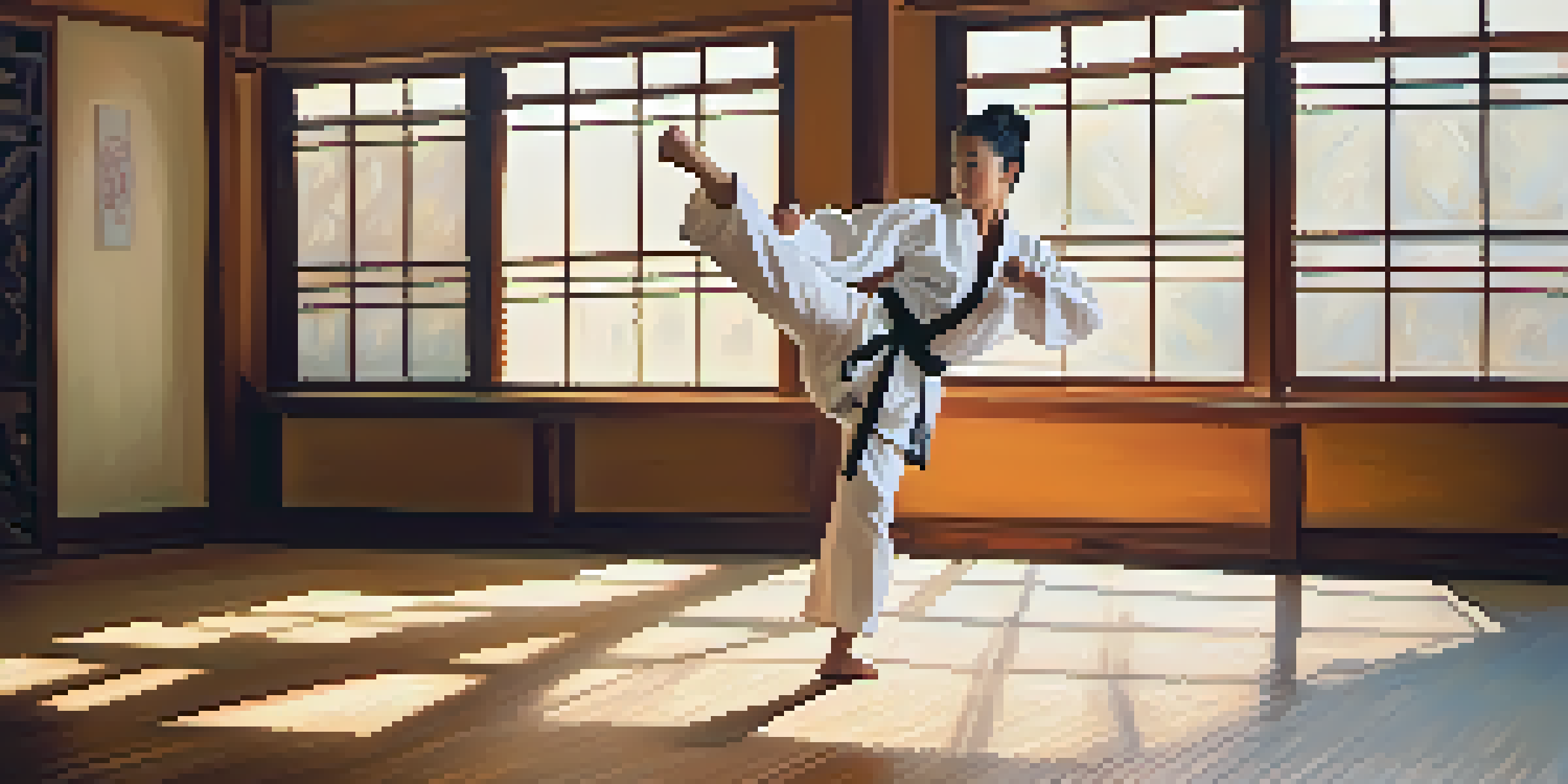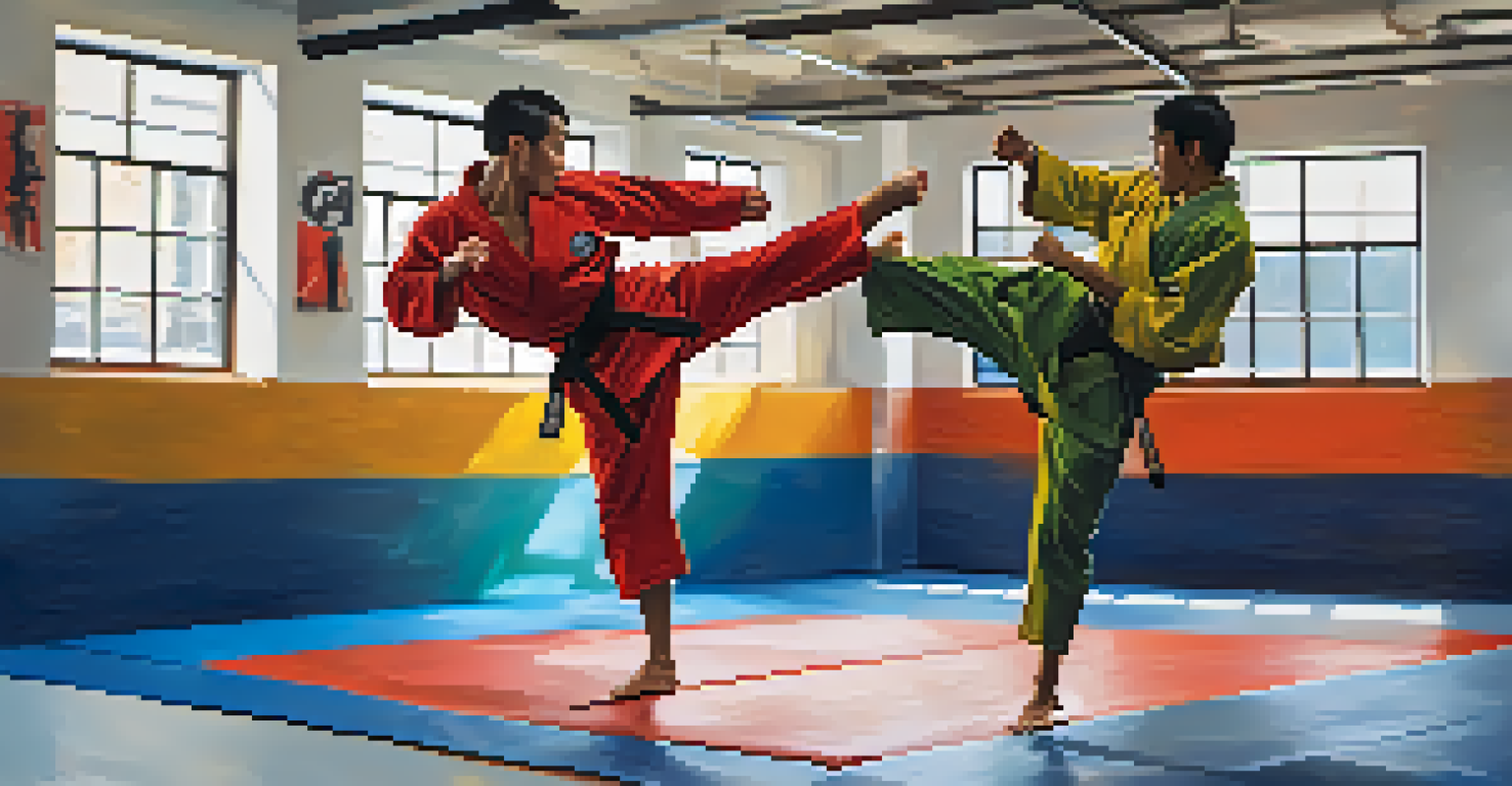How Mind-Body Connection Affects Sparring in Martial Arts

Understanding the Mind-Body Connection in Martial Arts
The mind-body connection refers to the intricate relationship between our mental state and physical performance. In martial arts, this connection is vital, as mental clarity can significantly enhance sparring effectiveness. When practitioners engage their minds, they can better anticipate movements and respond with agility.
The mind is everything. What you think you become.
For instance, a calm and focused mindset allows martial artists to execute techniques with precision. Conversely, anxiety or distractions can lead to hesitations, impacting their overall performance. This showcases how the mind can either be a powerful ally or a challenging adversary in the heat of sparring.
Ultimately, understanding this connection is the first step towards harnessing its potential. By recognizing how thoughts and emotions affect physical actions, martial artists can work towards a more harmonious balance during sparring sessions.
The Role of Focus and Concentration in Sparring
Focus and concentration are essential components of effective sparring. When a martial artist is fully present, they can better analyze their opponent's movements and react accordingly. This heightened awareness often leads to improved decision-making and quicker reflexes during matches.

On the flipside, distractions—whether internal or external—can derail this focus. For example, worrying about a past mistake or getting distracted by the audience can cause a lapse in concentration, making it harder to perform effectively. Therefore, cultivating the ability to concentrate under pressure is crucial for success.
Mind-Body Connection Boosts Sparring
A strong mind-body connection enhances mental clarity, enabling martial artists to anticipate movements and respond effectively during sparring.
Practicing mindfulness techniques, such as deep breathing or visualization, can help sharpen focus. By incorporating these strategies into their training, martial artists can enhance their sparring performance and maintain a competitive edge.
Emotional Regulation and Its Impact on Sparring
Emotional regulation plays a vital role in martial arts sparring. Being able to manage emotions like fear, frustration, or excitement can influence how a martial artist performs. When emotions are in check, practitioners are more likely to maintain composure and make strategic decisions during sparring.
Success is where preparation and opportunity meet.
For instance, a fighter who feels overwhelmed by anxiety may struggle to execute techniques effectively. On the other hand, those who can channel their emotions positively—turning nervous energy into motivation—tend to perform better. This highlights the importance of emotional intelligence in martial arts.
To enhance emotional regulation, martial artists can engage in self-reflection and practice techniques such as visualization. By envisioning successful sparring scenarios, they can build confidence and better manage their emotions when it matters most.
The Influence of Mental Visualization Techniques
Mental visualization is a powerful tool that many martial artists use to enhance their sparring skills. By picturing themselves executing techniques successfully, they can improve their muscle memory and build confidence. This mental rehearsal allows athletes to practice in their minds even when they can't engage physically.
For example, a martial artist might visualize a sparring session, focusing on their footwork and striking techniques. This practice can help solidify these movements in their subconscious, making them more instinctive during actual sparring. Visualization bridges the gap between mental preparation and physical execution.
Focus and Concentration are Key
Maintaining focus and concentration is crucial for martial artists, as distractions can hinder performance and decision-making in sparring.
Incorporating visualization into regular training routines can yield significant benefits. By dedicating time to this technique, martial artists can enhance their performance and foster a stronger mind-body connection.
The Importance of Breath Control in Sparring
Breath control is often an overlooked aspect of sparring that can greatly impact performance. Proper breathing techniques help martial artists maintain energy levels and focus during intense sessions. By controlling their breath, they can reduce stress and anxiety, allowing for clearer thinking.
For instance, a martial artist who practices deep, rhythmic breathing can enhance their endurance and stamina. This allows them to remain composed and agile, even in high-pressure situations. Conversely, shallow or erratic breathing can lead to fatigue and decreased performance.
Integrating breath control practices into training can support better performance in sparring. Techniques like diaphragmatic breathing can help martial artists stay calm and focused, ultimately improving their overall sparring experience.
Mindfulness Practices to Enhance Sparring Performance
Mindfulness practices can significantly enhance a martial artist's sparring experience. By focusing on the present moment, practitioners can improve their awareness and responsiveness during matches. This heightened state of mindfulness allows them to react more fluidly to their opponent's movements.
For example, incorporating mindfulness meditation into training routines can help martial artists cultivate a greater sense of awareness. This can lead to improved focus and the ability to stay calm under pressure, ultimately benefiting their sparring performance. It's like training the mind to be as agile as the body.
Emotional Regulation Improves Performance
Managing emotions like fear and anxiety allows martial artists to maintain composure and make better strategic decisions during sparring.
Additionally, mindfulness can foster a deeper connection to one's own body. By tuning into physical sensations, martial artists can better understand their strengths and weaknesses, leading to more effective sparring strategies.
Creating a Balanced Mind-Body Approach to Sparring
Achieving a balanced mind-body approach in sparring involves integrating mental and physical training. This means not only honing physical techniques but also nurturing mental resilience and emotional regulation. By addressing both aspects, martial artists can elevate their sparring performance to new heights.
For instance, a well-rounded training regimen might include physical drills alongside mindfulness exercises and visualization techniques. This holistic approach helps practitioners develop a more comprehensive skill set, enhancing their adaptability in the ring. It’s like having the perfect recipe for success.

Ultimately, cultivating this balance leads to improved confidence, focus, and performance. By committing to both mental and physical aspects of training, martial artists can create a more effective sparring experience, transforming challenges into opportunities for growth.